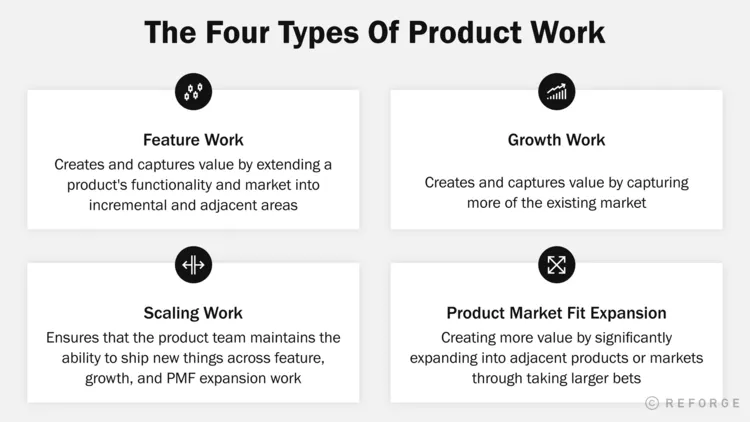Crafting Your PM Career with Four Types of Product Work
In my previous post, "Enhancing Technical Expertise as a Non-tech Product Manager," I shared that not all PM roles are the same in terms of roles and levels. As a result, the required skills (including technical understanding) for each PM role can vary significantly.
In today's post, I'll delve deeper into what makes these differences in PM roles, and how we leverage them to shape our career path in product management.
Understanding Four Types of Product Work and PM Specializations
"Most PMs are unaware of the different types of product work and which one is most relevant to them for what they are working on. This makes it difficult for them to be effective in their role, as they are using a sub-optimal or incorrect method (hammer/nail problem) and not thinking strategically about their product and how to transition to the other problem types."
— Fareed Mosavat, VP Programs/Partners @ Reforge
Beyond fundamental skills like problem-solving and communication, the roles and skill requirements for each PM vary significantly depending on the product work they engage in. In the article titled “Product Specializations”, Reforge classifies them into four types of Product Work:
1. Feature Work (Core PM)
Feature Work is where most Product Managers start in their careers. As shared by Reforge:
Once a product reaches initial product-market fit, feature work creates and captures value by extending a product's functionality and market into incremental and adjacent areas.
In simpler terms, feature work focuses on addressing customer pain points and needs by building additional features for existing products. Product Managers who primarily focus on feature work are often referred to as Core PMs.
2. Growth Work (Growth PM)
Growth PMs specialize in Growth Work, which involves creating and capturing value by acquiring more customers from the existing market. Instead of developing new features like Core PM, Growth PMs focus on optimizing existing product features to drive user acquisition and retention.
3. Scaling Work (Platform PM)
As our product expands and our team grows, new bottlenecks emerge that hinder the team's ability to ship new features efficiently. Platform PMs who specialize Scaling work will focus on address these internal bottlenecks to ensure the team can continue to innovate and deliver value to customers.
4. Product-Market Fit Expansion (PMF PM)
Product-Market Fit Expansion involves extending an existing product into adjacent markets or introducing new products to sustain growth.
While Feature Work and Growth Work are crucial for achieving initial product-market fit (PMF), PMF Expansion becomes vital when product growth plateaus due to market saturation. PMs specializing in PMF Expansion are referred to as PMF PMs.
Developing Your Career Path Based on Product Work
Similar to choosing between being a generalist (Comb shape) or a specialist (T shape), there are two main paths you can take to develop your career in product management:
Generalist
A generalist approach involves gaining experience in various areas of product work, such as feature development, growth optimization, and scaling strategies. This broad skill set allows you to adapt to different challenges and roles within product management.
Specialist
On the other hand, specializing in a specific area of product work, such as growth or product-market fit expansion, allows you to become an expert in that domain. This focused expertise can open up opportunities for leadership roles and deeper impact within a particular aspect of product management.
In conclusion, understanding the different types of product work and PM specializations is essential for shaping your career path in product management. Whether you choose to be a generalist or a specialist, each path offers unique opportunities for growth and advancement in the field.
If you’re finding this post valuable, share it with a friend, and consider subscribing if you haven’t already.
#WOTN5 Bài viết thuộc thử thách viết 30 ngày của khóa học Writing On The Net.







